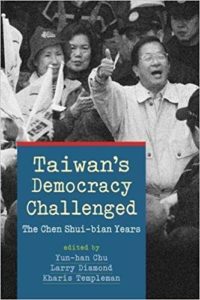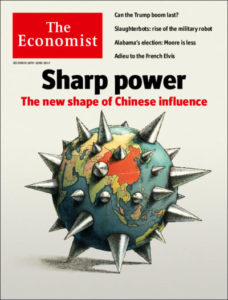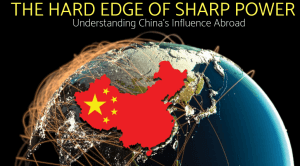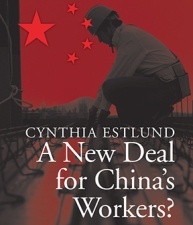 Since Taiwan’s pro-independence Democratic Progressive party (DPP) won the presidency and a parliamentary majority in 2016, China has ramped up pressure against Taipei on all fronts. Now, the DPP government charges that Beijing is trying to meddle from within as the island’s voters prepare to pick mayors, regional and local lawmakers, as well as borough wardens and village heads, The FT reports:
Since Taiwan’s pro-independence Democratic Progressive party (DPP) won the presidency and a parliamentary majority in 2016, China has ramped up pressure against Taipei on all fronts. Now, the DPP government charges that Beijing is trying to meddle from within as the island’s voters prepare to pick mayors, regional and local lawmakers, as well as borough wardens and village heads, The FT reports:
Officials say China is seeking to corrode Taiwan’s body politic through infiltration and disinformation — an accusation that echoes the growing debate in a number of western countries over attempts by authoritarian states to weaken democratic adversaries. Although Saturday’s election will focus on local issues, politicians and experts say it is likely to predetermine the future of cross-Strait relations because a DPP defeat could block the road to re-election in 2020 for President Tsai Ing-wen, the prime target of Beijing’s wrath.
Taiwan is a textbook case of China’s use of “sharp power” to manipulate or undermine a democracy and project its influence abroad, a situation that did not sound alarm bells until recently, political scientist Wu Rwei-ren said Wednesday.
The panoply of information operations launched by China’s cyber army against candidates during the election campaign is “the biggest crisis facing Taiwan’s democracy,” said Wu, an associate research fellow at the Academia Sinica.
 The National Endowment for Democracy coined the term sharp power, noting that China and Russia can “pierce, penetrate or perforate the political and information environments in targeted countries….enabl[ing] authoritarians to cut into the fabric of a society, stoking and amplifying existing divisions,” The FT adds:
The National Endowment for Democracy coined the term sharp power, noting that China and Russia can “pierce, penetrate or perforate the political and information environments in targeted countries….enabl[ing] authoritarians to cut into the fabric of a society, stoking and amplifying existing divisions,” The FT adds:
China has made no secret of its intention to do just that to Taiwan. In an editorial in December 2016, months after the DPP’s victory, the Global Times, a nationalist tabloid owned by the Communist party’s mouthpiece People’s Daily, wrote in an editorial: “We will Lebanonise Taiwan if necessary,” suggesting that China could turn opposing ethnic, political and social groups inside Taiwan against each other as has happened in the Middle Eastern country.
It is easy to be wowed by the apparent near-term efficiency and purpose of authoritarian regimes, but democracy brings its own powerful — and longer-term —advantages to the conduct of foreign affairs, notes Hal Brands, the Henry Kissinger Distinguished Professor at Johns Hopkins University’s School of Advanced International Studies,
 One of these advantages, counterintuitively enough, is better decision-making, he writes for Bloomberg Opinion:
One of these advantages, counterintuitively enough, is better decision-making, he writes for Bloomberg Opinion:
- Checks and balances and raucous public debate make democratic decision-making slow and messy. But they also promote reasoned deliberation and the ability to correct course when necessary. Centralization of power and the dominance of a small elite allow authoritarian regimes to move faster, but they can lend themselves to big mistakes…..
- Second, democracies have traditionally been better at generating long-term economic power, because democratic rule fosters the free exchange of information, stable legal frameworks and individual rights that unleash innovation and growth. …To be sure, China’s rapid growth has been testing this historical law in recent decades. Yet corruption, patronage and the power of entrenched interests are all impeding the liberalizing reforms needed to sustain that growth over time. ….
- Third, democracies are usually better at winning friends and influencing people on the global stage. … According to an estimate from the Economist, 100 of the world’s 150 largest states lean toward America, with only 21 leaning against it. Russia and China have few allies or genuine partners, and those that they have tend to be relatively weak and isolated authoritarian regimes.
 Finally, there is the imbalance of soft power. Much has been made — with good reason — of the way the Trump administration has been debasing U.S. soft power, through abrasive policies and offensive rhetoric. But American soft power has traditionally proved resilient, because it derives more from what the country is — an inclusive democracy dedicated to the dignity of the individual — than from the actions of any single leader. …
Finally, there is the imbalance of soft power. Much has been made — with good reason — of the way the Trump administration has been debasing U.S. soft power, through abrasive policies and offensive rhetoric. But American soft power has traditionally proved resilient, because it derives more from what the country is — an inclusive democracy dedicated to the dignity of the individual — than from the actions of any single leader. …
“Global opinion polling bears this out. A survey conducted in 2016 revealed overwhelming majorities in nearly every country surveyed had a negative view of Beijing’s approach to individual freedoms,” Brands adds. “And last month, the populations of all but two nations surveyed (Argentina and Tunisia) preferred the U.S. over China as a global leader.”
 It’s hardly a sign of ideological confidence when a ruling Communist Party persecutes young Marxists for defending workers’ rights.
It’s hardly a sign of ideological confidence when a ruling Communist Party persecutes young Marxists for defending workers’ rights.
“As Communists, we should incorporate Marxist classics and principles into our lifestyle and treat Marxism as a spiritual pursuit,” President Xi Jinping said at an event celebrating the bicentennial of Marx’s birth in May.
But this August, police arrested more than 50 student activists, many of them members of college Marxist groups, for helping organize workers at Jasic Technology, a welding equipment factory in the southeastern Chinese city of Shenzhen, NPR reports. At least two Peking University graduates remain missing. Footage of the police operation was posted to YouTube (above) by Voice of America, a U.S. government-funded news service.







